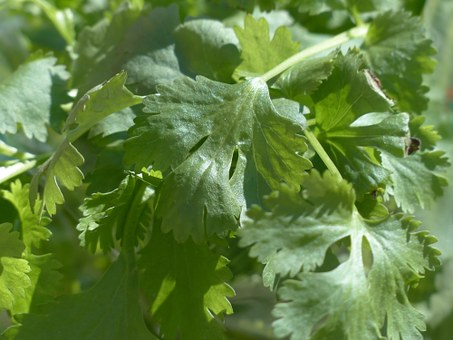Anti-Inflammatory and Cytoprotective Effects of Selected Pakistani Medicinal Plants in Helicobacter Pylori-Infected Gastric Epithelial Cells
© Authored by PubMed
© HealthyMuslim. See Terms and Conditions
Copy Link
Email
Print

Coriander (Coriandrum sativum), also known as cilantro, Chinese parsley or dhania, is an annual herb in the family Apiaceae. Coriander is native to regions spanning from southern Europe and North Africa to southwestern Asia.
Zaidi SF, Muhammad JS, Shahryar S, Usmanghani K, Gilani AH, Jafri W, Sugiyama T. Anti-inflammatory and cytoprotective effects of selected Pakistani medicinal plants in Helicobacter pylori-infected gastric epithelial cells. 1. J Ethnopharmacol. 2012 May 7;141(1):403-10. Epub 2012 Mar 13.
Zaidi SF, Muhammad JS, Shahryar S, Usmanghani K, Gilani AH, Jafri W, Sugiyama T. Anti-inflammatory and cytoprotective effects of selected Pakistani medicinal plants in Helicobacter pylori-infected gastric epithelial cells. 1. J Ethnopharmacol. 2012 May 7;141(1):403-10. Epub 2012 Mar 13.
ETHNOPHARMACOLOGICAL RELEVANCE: Helicobacter pylori infection is associated with gastritis, peptic ulcer, and gastric cancer. Due to its high global prevalence and uprising resistance to available antibiotics, efforts are now directed to identify alternative source to treat and prevent associated disorders. In the present study, effect of selected indigenous medicinal plants of Pakistan was evaluated on the secretion of interleukin-8 (IL-8) and generation of reactive oxygen species (ROS) in a bid to rationalize their medicinal use and to examine the anti-inflammatory and cytoprotective effects in gastric epithelial cells. MATERIALS AND METHODS: AGS cells and clinically isolated Helicobacter pylori strain (193C) were employed for co-culture experiments. Anti-Helicobacter pylori activity and cytotoxic effects of the selected plants were determined by serial dilution method and DNA fragmentation assay respectively. ELISA and flow cytometry were performed to evaluate the effect on IL-8 secretion and ROS generation in Helicobacter pylori-infected cells. RESULTS: At 100?g/ml, extracts of Alpinia galangal, Cinnamomum cassia, Cinnamomum tamala, Mentha arvensis, Myrtus communis, Oligochaeta ramose, Polygonum bistorta, Rosa damascena, Ruta graveolens, Syzygium aromaticum, Tamarix dioica, and Terminalia chebula exhibited strong inhibitory activity against IL-8 secretion. Of these, four extracts of Cinnamomum cassia, Myrtus communis, Syzygium aromaticum, and Terminalia chebula markedly inhibited IL-8 secretion at both 50 and 100?g/ml. Cinnamomum cassia was further assessed at different concentrations against Helicobacter pylori and TNF-? stimulated IL-8 secretion, which displayed significant suppression of IL-8 in a concentration-dependent-manner. Among the plants examined against ROS generation, Achillea millefolium, Berberis aristata, Coriandrum sativum, Foeniculum vulgare, Matricaria chamomilla and Prunus domestica demonstrated significant suppression of ROS from Helicobacter pylori-infected cells (p<0.01). CONCLUSION: Results of the study revealed anti-inflammatory and cytoprotective effects of selected medicinal plants which could partially validate the traditional use of these plants in GI disorders particularly associated with Helicobacter pylori. Furthermore, results obtained may lead to possible future candidates of chemoprevention against peptic ulcer or gastric cancer.
Link to this article: Show: HTML Link • Full Link • Short Link
Share or Bookmark this page: You will need to have an account with the selected service in order to post links or bookmark this page.





|
Related Articles:
- Evaluation of Disease Modifying Activity of Coriandrum Sativum in Experimental Models
- Cardio Protective Effect of Coriandrum Sativum L. on Isoproterenol Induced Myocardial Necrosis in Rats
- Antifungal Activity, Toxicity and Chemical Composition of the Essential Oil of Coriandrum Sativum L. Fruits
- Assessment of Vitamin and Carotenoid Concentrations of Emerging Food Products: Edible Microgreens
- Flush Out Toxic Heavy Metals With Coriander
- Coriander: A Beneficial Herb and Spice
You must be registered and logged in to comment.
Most Popular
Latest Articles
Popular Subjects
Health, fitness and longevity
Based upon the principles of health
in the Qur'an and Prophetic Traditions.
HealthyMuslim.Com
There are two bounties in which
most people lose out: good health
and free time. Al-Bukhari.
The information on this site is provided for educational purposes only. It is not intended as a substitute for professional advice of any kind.























